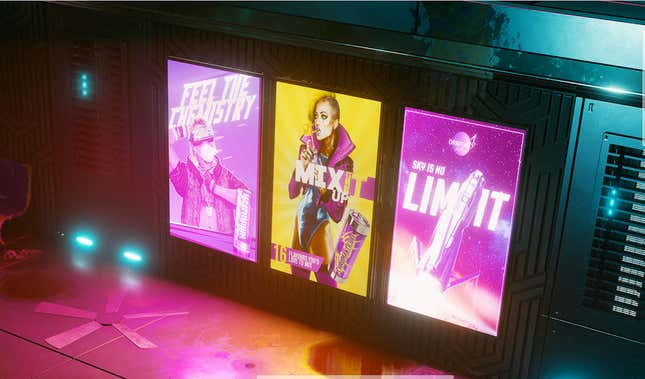
A screenshot from Cyberpunk 2077 featuring a hypersexualized advertisement depicting a trans woman drew skepticism today on social media. The artist responsible has spoken up claiming no offense was meant and that the art is a commentary on corporate marketing.
The image in question comes from an in-game advertisement for a product called Chromanticure, which appears to be a soft drink with multiple flavors that are meant to be mixed and matched. The screenshot containing the ad comes from an Nvidia announcement about ray-tracing in Cyberpunk 2077. The advertisement features a sexualized female model with a large penis visible underneath her clothes. The slogan reads “mix it up.” The somewhat-teasing slogan and prominent genitalia drew a reaction on Twitter, with some users expressing skepticism or confusion about the advertisement’s context and purpose. In an interview with Polygon, CD Projekt Red arist Kasia Redesiuk spoke about the artwork.

“Personally, for me, this person is sexy,” Redesiuk said to Polygon. “I like how this person looks. However, this model is used — their beautiful body is used — for corporate reasons. They are displayed there just as a thing, and that’s the terrible part of it.”
Redesiuk added, “Cyberpunk 2077 is a dystopian future where megacorporations dictate everything. They try to, and successfully, influence people’s lives. They shove products down their throats. They create those very aggressive advertisements that use, and abuse, a lot of people’s needs and instincts. So, hypersexualization is apparent everywhere, and in our ads there are many examples of hypersexualized women, hypersexualized men, and hypersexualized people in between.”
CD Projekt Red and associated CD Projekt entities like GOG have previously come under fire for social media faux-pas involving trans people. Last August, the official Cyberpunk 2077 Twitter account made a joke about assuming someone’s gender, perceived to be mocking people’s self-identification (Correction 6:09pm—We originally wrote that this tweet referenced “attack helicopters,” widely perceived to be a transphobic meme. We regret the error.) The studio later apologized. In October, the GOG Twitter account appropriated the hashtag #WontBeErased to talk about their catalogue of computer games. The hashtag’ originated as a way to raise awareness of a Trump administration memo about narrowing the legal definition of “sex” in federal law.
While the cyberpunk genre does focus on corporate manipulation, it’s also a genre colored by the anxieties of the time it was created. In Cyberpunk as a tabletop roleplaying game, a mechanic called Humanity denotes someone’s fundamental connection to their body and their human nature. This value can be reduced to dangerous levels with too many cyber-modifications. Sex changes also lower a player’s Humanity score in some rulebooks for Cyberpunk 2020. Players with a low enough Humanity enter into a violent state called cyberpsychosis. In real life, trans people don’t need to worry about going cyber-psychotic. (Shocking, I know!) I just take my hormones every day and enjoy fantastic benefits like softer skin. We’ll have to wait until Cyberpunk 2077 comes out to see how much humanity, sex changes, or cyberpsychosis will be incorporated.
Redesiuk offered an apology to those who were troubled by the in-game advertisement.
“I would say it was never the intention to offend anyone,” Redesiuk said. “However, with this image of an oversexualized person, we did want to show how oversexualization of people is bad. And that’s it.”

